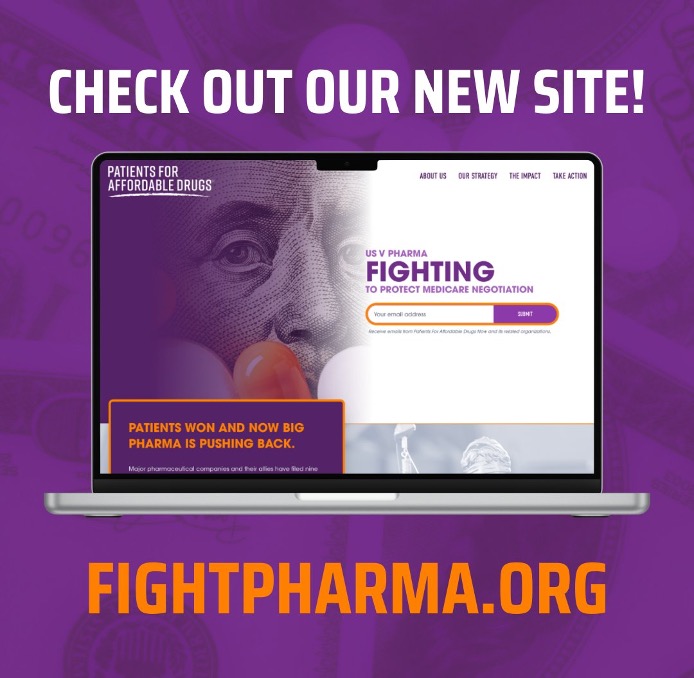Welcome to the Week in Review.
1. Patient Advocate Introduces POTUS
- Kris Garcia, a husband, father of four, and a P4AD patient advocate from Colorado introduced the President at the White House on Wednesday during an event hosted by President Biden and Senator Sanders focused on their efforts to lower the out-of-pocket cost of inhalers. This is a topic deeply personal to Kris who lives with chronic asthma, multiple bleeding disorders, and severe allergies. To manage his health, Kris relies on several expensive medications, including inhalers, and shared that the treatments he needs just to stay alive cost $800 a month, even after insurance coverage. The financial strain of these essential medicines has forced him to work extra shifts and has led him to ration doses, or forgo some of his prescribed treatments altogether. However, pressure from advocates and lawmakers has led three of the four largest inhaler manufacturers to commit to capping the out-of-pocket cost of their inhalers at $35 a month. This news, coupled with some of the drug price reforms in the Inflation Reduction Act, represents a glimmer of hope for Kris and millions of patients like him who will soon, as Kris put it, “spend less time worrying about surviving”, and more time living their lives. — (ABC 27, P4AD, P4AD, The Hill, The Washington Post, CBS News, Common Dreams)

2. P4AD Launches New Tool to Defend Medicare Negotiations
- As part of our ongoing campaign, US v. Pharma; Fighting to Protect Medicare Negotiation, P4AD unveiled a new tool: FightPharma.org. The website serves as a dedicated platform for our campaign to counter Big Pharma’s legal efforts to stop the implementation of Medicare negotiation. Currently, pharmaceutical corporations and their allies have filed nine lawsuits and additional appeals in an attempt to halt the program. Fightpharma.org will be updated with information on the status of these lawsuits and will provide opportunities for patients and advocates to take action, ensuring that the courts hear the lived experiences of those harmed or hurting from high drug prices. Se habla español? Stay tuned for a Spanish site coming in the next couple of weeks!

3. Lowering Drug Costs For Women
- Women experience disproportionately higher rates of certain health conditions and also encounter higher health care costs relative to men. This financial burden is further exacerbated for women of color and women who have low incomes. A recent analysis from the Department of Health and Human Services’ (HHS) Office of the Assistant Secretary for Planning and Evaluation (ASPE) illuminates how the Inflation Reduction Act is delivering much-needed relief to some of the nearly 30 million women who have Medicare Part D coverage. According to the findings, in 2020, approximately 733,000 women on Medicare would have experienced considerable relief had the $35 monthly insulin copay cap been in effect. Additionally, in 2021, around two million women would have benefited from the provision eliminating cost-sharing for vaccines. Looking ahead, the analysis predicts that the $2,000 out-of-pocket cap, effective in 2025, along with other provisions in the drug price law, will reduce women’s Medicare out-of-pocket expenses by an average of 28 percent, saving them around $128 per year on average. These significant insights were highlighted at an event hosted by HHS this Tuesday, attended by P4AD and numerous allies, all eager to celebrate the transformative impact of the Inflation Reduction Act on patients grappling with exorbitant drug prices, particularly those who have been historically disenfranchised. — (Managed Healthcare Executive, Center For American Progress, ASPE, Mirage News, P4AD)
PHARMA FACT CHECK: The Centers for Medicare and Medicaid Services (CMS) remains in negotiation with manufacturers of the initial 10 drugs selected for negotiations, having rejected their latest counter offers. Contrary to the assertions of Big Pharma and its allies that Medicare negotiation constitutes “price-setting,” recent actions by both drug companies and CMS, involving offers and counteroffers, debunk this narrative and underscore a genuine negotiation process.
